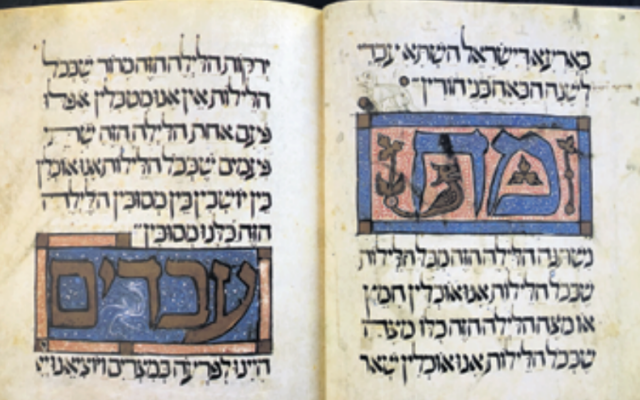Ma Nishtana – Why is this night different?
This ritual and others like removing the food early on, as if the meal was over were established to encourage a culture of questions.
Asking the four questions is a highlight of the seder, particularly for my children, who prepare them diligently. Have you ever wondered why we start the seder with questions? Wouldn’t it make more sense to first recount the story of the Exodus and then invite questions if there is time?
The seder’s question-and-answer format is not a coincidence, but derived from the Torah. “When your child asks you in time to come, saying, ‘What are the testimonies, the statutes, and the ordinances that God has commanded you?’ Then you shall tell your child, ‘We were slaves to Pharaoh in Egypt and God took us out of Egypt with a strong hand.’” (Shemot 13:8-9).
It’s interesting to note that the Torah actually mandates that the seder night be structured in a question-and-answer format. What’s more, the verse isn’t solely referring to a child’s question about the Passover ritual; it encompasses any question about Judaism throughout the year. In other words, the Torah portrays Jewish education as a response to questions.
This concept may seem unusual at first. After all, isn’t Judaism often considered one of the great “faiths” that calls upon its followers to simply accept and believe? Wouldn’t questions be counterproductive or even detrimental to faith?
Socrates, Plato’s renowned Greek philosopher and mentor, tended to pose unsettling questions. Even today, persistent questioning aimed at gaining clarity is called the Socratic method. Due to this behaviour and other reasons, Socrates was put on trial by the Athenians and charged with “corrupting the young”. He was ultimately sentenced to death.
In his Haggadah, the late Rabbi Lord Jonathan Sacks argues, “Teaching the young to ask questions is an essential feature of Pesach in Judaism. In fact, the Haggadah, which narrates the Passover story, must be presented in response to a question asked by a child. Lacking questions does not signify faith, but a lack of depth. As for the child who does not know how to ask, you must begin to teach him how.”
Our sages instituted several customs of the seder night to encourage children to ask questions. “We dip the vegetable in saltwater and eat it in order to arouse the interest of the children, since it isn’t something we do throughout the rest of the year.” (Talmud, Pesachim 114a-b).
In other words, this ritual and others like removing the food early on, as if the meal was over were established to encourage a culture of questions.
Similarly, Jeff Bezos, founder and CEO of Amazon.com, emphasised the importance of delivering value to customers and being both the price and customer service leader for the long run. To ensure this, he built frugality into Amazon’s culture.
Back in 1995, when Amazon had just a few employees, Jeff Bezos and his fifth employee, Nico Lovejoy, came up with a clever way to save costs on office desks. As Lovejoy recalled, “We happened to be across the street from a Home Depot. He looked at desks for sale and looked at doors for sale, and the doors were a lot cheaper, so he decided to buy a door and put some legs on it.”
These makeshift “door desks” have since become a symbol of Amazon’s core value of frugality, and thousands of employees still use modern versions of them. The door desks have even become a makeshift trophy, with Amazon giving out Door Desk Awards for well-built ideas that deliver low prices to customers. The door desks represent ingenuity, creativity, and the willingness to take a unique path.
As we approach this year’s seder, it’s important to acknowledge Judaism’s strong emphasis on questioning. The Jewish tradition embraces all kinds of questions, including those that are difficult, challenging, and even ones that question God or the status quo. These can be questions that challenge us personally or pose ethical and moral dilemmas.
We may not know all the answers but, as long as we keep asking them, we can continue to learn, grow and evolve as individuals and as a community. By embracing the value of questioning, we can challenge ourselves to think critically and engage with the world in a more thoughtful and deliberate way.
Let us approach the seder with an open mind and a willingness to ask and explore the hard questions, knowing that this is an essential part of our Jewish tradition and identity.
Mendy Ajzenszmidt is rabbi of South Caulfield Hebrew Congregation.


comments